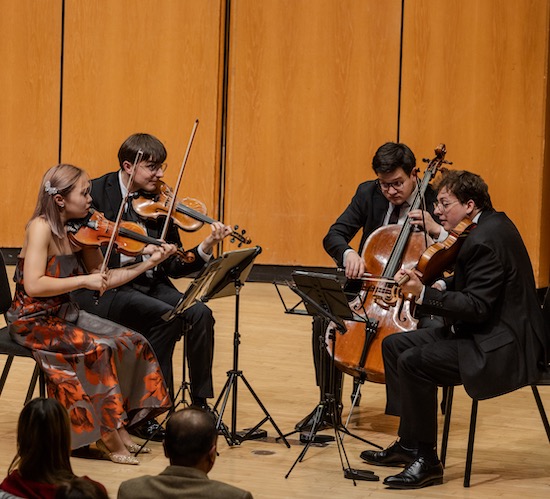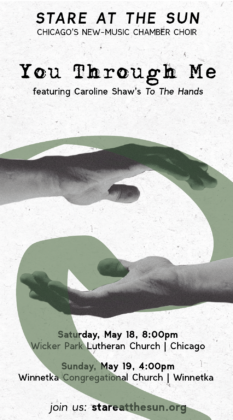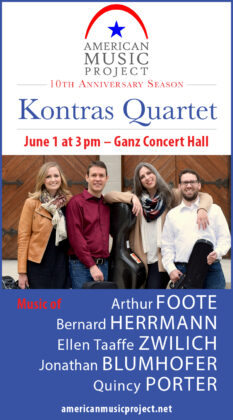Balourdet Quartet opens Winter Chamber Music Festival with first-class Beethoven

Musically speaking, 2024 is coming in like a lamb.
The Chicago Symphony Orchestra is on a European tour with Riccardo Muti throughout January and most local presenters are quiescent until the latter part of the month.
Fortunately, the Winter Chamber Music Festival has once again come to the rescue. Now marking its 27th season, Northwestern University’s venerable series, helmed by founder and CSO violinist Blair Milton, is providing musical warmth to banish the winter chill with three weekends of concerts through January 21.
This year’s installment opened with the Balourdet Quartet, who drew a packed house to their festival debut Friday night at Pick-Staiger Concert Hall in Evanston.
The youthful ensemble was formed in 2018 when its members met as students at Rice University. They have won several major competition awards and are currently ensemble-in-residence at Indiana University’s Jacobs School of Music. The group’s quirky humor is displayed in the fact that they are likely the only actively performing string quartet named after a chef.
The Balourdet is clearly a talented ensemble, as was made clear in the opening work, Mozart’s Quartet in D minor, K.421. One of the set of quartets dedicated to his great friend Haydn, the work is the composer’s only late quartet in a minor key, presenting a darker, more restless journey than most chamber works penned by Mozart.
The Balourdet Quartet plays seated closely together with a lot of animated body language (violist Benjamin Zannoni often nearly jumping off his chair). While flexible and technically secure, their corporate sonority is somewhat slender and grainy in tone, and in the Mozart was not always ideally blended.
The tense drama of K.421 was strongly manifest but the playing in the expansive opening movement felt hectic and choppy at times in an interpretation that felt like a work in progress. Even in this darker-hued Mozart, the music requires more grace and fluency. In the ensuing Andante the group played with focused concentration—and fine work by first violinist Justin DeFilippis—if not quite plumbing the depth of the slow movement’s tragic expression.
The final two movements went better. In the Menuetto, the players starkly contrasted the agitated main theme with the ars antiche-like trio to which they brought piquant charm. The finale’s motif was riven with restless unease and the players effectively characterized its ensuing variations, underlining Mozart’s mordant wit, while ensuring the lighter moments never quite dispelled the clouds.
The evening’s centerpiece provided a contemporary interlude with Karim Al-Zand’s Strange Machines. The piece was written for the Balourdet Quartet, by Al-Zand, a mentoring Rice professor. The tripartite work sequentially deconstructs/obliterates the Alberti bass line, Bach’s Goldberg Variations and the “Mannheim Rocket” crescendo by alternating frenzied furioso passages with pastiche takedowns of its inspirations.
The 2022 score is clever at times, with the Goldberg middle section working in a distorted version of the “Quodlibet” and ending in a hushed playing of the initial notes of Bach’s Aria theme. The group brought impressive energy and facility to the score, tackling the bipolar contrasts and slam-bang coda with striking unanimity and intensity. Yet, ultimately, while one section of Strange Machines might be effective as an encore, three movements of essentially the same musical shtick—like many an unsuccessful joke—goes on far too long to stay amusing.
It was back to serious music with the concluding work, Beethoven’s first “Razumovsky” Quartet in F major, Op. 59, no.1, which received the finest performance of the evening. Worthy as the playing was in the first half, the Beethoven performance was on a whole different level.
Like the Emersons, the Balourdet violinists switch off positions. With Angela Bae now in the first chair and leading with pure-toned precision, the group sounded more polished and unified as a unit as well as better blended. The Balourdet musicians clearly had a sense of the F major quartet’s scale as well as its varied, mercurial style and expressive depths.
Cellist Russell Houston—a Northwestern alum—launched the opening movement with a warmly rounded rendition of the main theme, bringing superb musicianship to his many ensuing solos as well. The group assayed the large movement with impressive focus and fluency, presenting a quiet yet gripping take on the development section and steadily building the drama to the movement’s climax. The gamboling quality of the quasi-scherzo was equally well done, each off-center episode registering clearly with emphatic rhythmic cut and hairpin dynamic turns.
The epic Adagio received a spacious, searching performance, rendered with acute concentration and expressive focus. Here the full depth of emotion was richly explored by Bae and colleagues, down to the most desolate pages.
Bae’s gentle avian trill at the end of the slow movement deftly segued into the bumptious, Russian-themed finale. Here, the musicians’ high-spirited playing delivered a genuine sense of release, the Balourdet members making the most of Beethoven’s dervish energy and multiple false endings, thrown off in rollicking fashion and with infectious spirit.
This was first-class Beethoven playing by any measure—enough to earn the gifted young musicians of the Balourdet Quartet a return ticket to next year’s festival.
The Winter Chamber Music Festival continues 3 p.m. Sunday with the Ariel Quartet performing Wolf’s Italian Serenade, Beethoven’s String Quartet in A major, Op, 18, no. 5, and Shostakovich’s Piano Quintet with Orion Weiss. music.northwestern.edu
Posted in Performances




